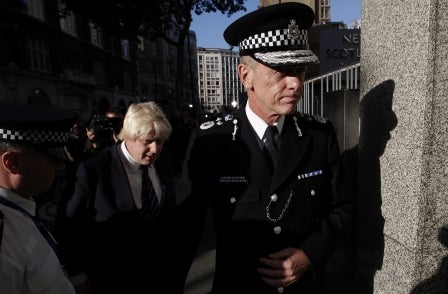
From time to time MPs and other government officials carelessly leave sensitive documents or laptops in public places.
Sometimes they get handed in to news organisations and this makes a story.
In 2008 a civil servant left top-secret documents "containing the latest intelligence on al-Qaeda" on a train. The envelope was handed in to the BBC, a journalist opened it – wrote a 'security breach' story and handed the envelope into police.
Opening that envelope probably broke all sorts of laws but until you've had a look you don't know what you've got. The subsequent story was clearly in the public interest.
In 2010 an MP's mobile phone was handed in to The Sun newspaper. Reporter Rhodri Phillips was handed a transcript of information from the phone and asked to write a memo to the newsdesk outlining whether or not there was a 'security breach' story to be written about it. There wasn't, no story appeared and the phone was handed back.
Years later, on 19 July 2012, a squad of police officers arrived at Phillips' London home at 6.30am. After searching his property for three hours and taking notebooks, diaries, mobile phones and computer equpipment he was carted off in front of his wife and children, aged 6 and 2, and locked up in a police cell on the other side of London. He was finally released at 5pm that night.
How upsetting and confusing it must have been for those young children to see police officers invade their home, search through their family's belongings and then take their father away. And all for what?
After 13 months on police bail, an ordeal in itself, Phillips was finally told yesterday he has no case to answer.
In the week in which David Miranda was detained for nine hours at Heathrow, and we learned that The Guardian had smashed computer hard drives overseen by GCHQ, this is a case which raises huge questions over the UK state's treatment of journalists (59 of whom have been arrested since April 2011).
Reporters shouldn't have more rights than anyone else, but they certainly shouldn't have any less.
Would any ordinary member of the public be treated in this way if they innocently came into the possession of a stolen mobile phone and then scrolled through contacts and text messages to find out who the owner was?
Sun parent company News Corp also has a case to answer for the treatment of Phillips. He was arrested after his email about the phone was passed to police by the company's own Management and Standards Committee.
The Met had a duty to investigate the matter. But surely even the most cursory of inquiries by either the MSC or the Met should have led to the common sense realisation that Phillips had no case to answer.
Phillips was arrested on suspicion of 'handling stolen goods', a charged used against fences and others who help a thief realise the value of their loot. Did the police really think Phillips was planning to head down to Camden market with that mobile to get a few quid for it?
I've asked the Met why it took them so long to deal with this matter and why Phillips warranted such heavy-handed treatment. They declined to comment so I can only speculate that Elveden, Tuleta and Weeting are huge operations and the police have their own reasons for the length of time it takes to decide whether or not suspects are charged.
Here are a few more questions which I think the police should answer:
-
Has there ever been another case of an individual being arrested for looking at information on a missing mobile phone which they did not know was stolen?
-
Why did police judge that Phillips was worthy of the dawn raid on his home treatment, arrest and questioning – rather than a more informal interview?
-
Is an ordinary member of the public breaking the law if they pick up a missing mobile phone and scroll through the contents to find the owner?
- Would Phillips have been treated like this if he was not a tabloid newspaper reporter?
Email pged@pressgazette.co.uk to point out mistakes, provide story tips or send in a letter for publication on our "Letters Page" blog
